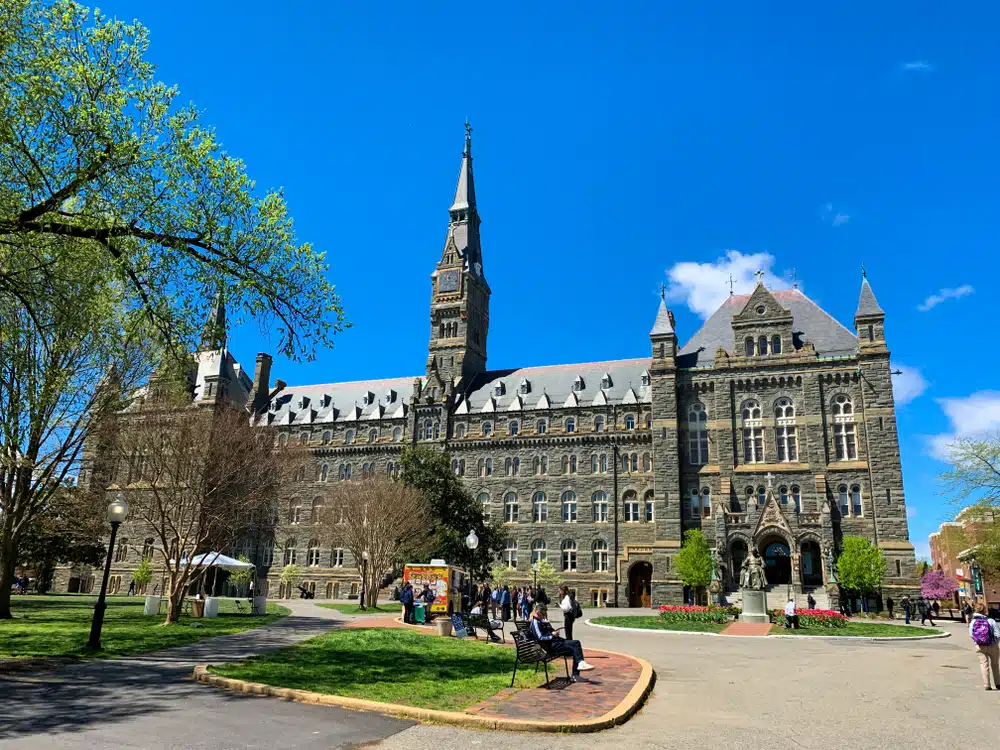Behind the Hoya Blue: A Close Look at the Pros and Cons of Attending Georgetown
Georgetown University is a prestigious and historic institution that has been attracting students from all over the world for centuries. Known for its rigorous academic programs, strong faculty, and diverse student body, Georgetown has been ranked among the top universities in the United States and is recognized for its commitment to service and social justice.
Given its stature and reputation, it is just fair that incoming students should know about the pros and cons of attending Georgetown before deciding to attend.
Purpose of the article
By examining the advantages and disadvantages of attending Georgetown, we hope to give students a better understanding of what it’s like to be a part of the Georgetown community and help them make a more informed decision about their future college plans.
From the university’s academic reputation to its location in Washington D.C. to the potential drawbacks of high costs and a competitive atmosphere, we will explore all aspects of Georgetown’s student experience.
By the end of this article, readers should have a more nuanced and realistic understanding of what it’s like to attend Georgetown and whether it’s the right fit for them.
What are the pros of attending Georgetown University?
What are the benefits of attending Georgetown University? With access to policymakers, non-profit organizations, and leading research centers, Georgetown students are uniquely positioned to engage with real-world problems and contribute to meaningful change.
The university’s commitment to Jesuit values, such as cura personalis (care of the whole person), also encourages a holistic educational experience.
This focus on personal and intellectual growth creates a supportive and enriching academic environment that fosters individual success and a strong sense of community.
Academic excellence and rigorous curriculum
Georgetown University is renowned for its rigorous and intellectually challenging academic programs, offering undergraduate and graduate degrees across a wide range of disciplines.
Its four undergraduate schools – Georgetown College, the School of Nursing and Health Studies, the School of Foreign Service, and the McDonough School of Business – each have their own distinct academic strengths and specialized curricula.
The university’s faculty is comprised of highly accomplished scholars, researchers, and practitioners, ensuring that students receive an education that is both theoretically grounded and practically relevant.
Georgetown’s emphasis on research, experiential learning, and interdisciplinary collaboration also allows students to engage with complex, real-world problems, preparing them for successful careers in their chosen fields.
Strong reputation and recognition
Georgetown University’s distinguished reputation is a testament to its dedication to academic excellence, research, and global engagement.
The university consistently ranks among the top 25 national universities in the United States, according to U.S. News & World Report.
Furthermore, it boasts an impressive list of successful and influential alumni, including former U.S. President Bill Clinton, Supreme Court Justice Antonin Scalia, and numerous members of Congress, diplomats, and business leaders.
The prestige and recognition of Georgetown’s programs, particularly in areas such as international relations, business, and public policy, ensure that its graduates are highly sought after by top employers and graduate schools alike.
As a result, Georgetown alumni benefit from a strong professional network and ample opportunities for career advancement in their respective fields.
Wide range of academic programs and majors
In weighing the pros and cons of attending Georgetown, you might encounter the school’s promotional materials showcasing its extensive selection of academic programs and majors, catering to a wide array of interests and career goals.
The four undergraduate schools – Georgetown College, the School of Nursing and Health Studies, the School of Foreign Service, and the McDonough School of Business – each offer unique curricula and specializations.
Students can choose from over 50 majors, including traditional fields like economics and biology, as well as interdisciplinary and innovative programs such as cognitive science, justice and peace studies, and global health.
Additionally, the university encourages students to pursue double majors, minors, and certificates to complement their primary areas of study, fostering a well-rounded and flexible education.
Georgetown is also proud of its medical school, which offers a range of medical education programs, including Doctor of Medicine (MD), dual-degree programs, and graduate-level programs in biomedical sciences. With a strong focus on research, clinical experience, and community service
Opportunities for research, internships, and career development
Georgetown University’s location in the heart of Washington, D.C., serves as a launchpad for students to access unparalleled research, internship, and career development opportunities.
The university’s close proximity to government agencies, non-profit organizations, think tanks and leading private sector companies offer students a unique chance to engage with real-world issues and gain hands-on experience in their fields of interest.
Georgetown’s dedicated career center, the Cawley Career Education Center, provides students with resources and guidance to help them navigate the competitive job market, secure internships, and develop professional skills.
In addition, the university’s excellent research infrastructure and connections to famous research organizations like the National Institutes of Health allow students to work with professionals and make ground-breaking findings.
These opportunities, combined with Georgetown’s strong academic foundation, ensure that its graduates are well-equipped to excel in their chosen professions and make a lasting impact in their fields.
What are the cons of attending Georgetown University?
What are the disadvantages of attending Georgetown University? Despite its many strengths, Georgetown University also has its share of drawbacks.
As with any institution, prospective students must weigh these potential disadvantages, the other side of the pros and cons of attending Georgetown.
High cost of attendance and limited financial aid
One significant concern for many prospective students is Georgetown’s high cost of attendance. Tuition, housing, and other expenses can be quite steep, making the university less accessible for students from lower-income backgrounds.
While Georgetown does offer need-based financial aid, its resources are not unlimited, and some students may find themselves without sufficient support to cover the full cost of attendance.
Additionally, Georgetown does not guarantee to meet 100% of demonstrated financial need for all admitted students, which may leave some families struggling to bridge the gap between the aid they receive and the actual cost of attending the university.
Prospective students are encouraged to explore external scholarships and grants to supplement Georgetown’s financial aid offerings, but the availability and competitiveness of these resources can vary significantly.
Competitive and stressful environment
Georgetown University’s rigorous academic programs and high-achieving student body can create a competitive and high-pressure environment.
While this atmosphere may foster excellence and drive students to achieve their full potential, it can also lead to significant stress and a focus on individual success over collaboration. The university’s emphasis on grades and academic achievements may sometimes overshadow the importance of personal growth and overall well-being.
Some students may find the competitive nature of Georgetown’s academic environment overwhelming and struggle to balance their academic, extracurricular, and personal lives.
It is essential for students considering Georgetown to be aware of this aspect and evaluate their own resilience and coping mechanisms before committing to the university.
The school does offer resources to help students manage stress and maintain a healthy work-life balance, but individual experiences may vary.
Limited social scene and campus culture
In evaluating the pros and cons of attending Georgetown, some students might find the social scene and campus culture somewhat limited despite the university offering a rich array of extracurricular activities and student organizations
Given its urban location, Georgetown’s campus is relatively small and confined, which can lead to a feeling of insularity among students.
Furthermore, because of the university’s strong emphasis on academics and pre-professional development, other parts of campus life may be overshadowed, resulting in a less active and diversified social scene than one may find at other universities.
While there are opportunities for students to engage in the arts, athletics, and other recreational activities, those seeking a more expansive college experience may find Georgetown’s offerings to be somewhat lacking.
It is worth noting, however, that the university’s location in Washington, D.C., provides students with access to a plethora of cultural events, museums, and entertainment options beyond the campus boundaries.
Difficulties in navigating the bureaucracy and administration
As with any large institution, Georgetown University’s bureaucracy and administration can sometimes be challenging to navigate.
Students may encounter difficulties when trying to access resources, resolve issues, or obtain information about their academic programs, financial aid, or other aspects of campus life.
These administrative challenges can be particularly frustrating for students who require additional support or accommodations, such as those with disabilities or international students adjusting to life in the United States.
While Georgetown offers numerous resources and support services to help students overcome these challenges, the complexity of the university’s bureaucracy can sometimes hinder the effectiveness of these efforts.
Prospective students should be prepared to advocate for themselves and seek assistance when necessary in order to make the most of their Georgetown experience.
How to Determine if Georgetown Is the Right Fit for You?
Considering the pros and cons of attending Georgetown, how do you know whether Georgetown is suitable for you? Deciding whether Georgetown University is the right fit for you involves a careful evaluation of your personal values, academic interests, and long-term goals.
To make an informed decision, it’s crucial to gather as much information as possible about Georgetown’s academic programs, campus life, and resources.
Academic interests
A critical factor to consider when evaluating Georgetown University is whether its academic offerings align with your interests and career aspirations.
Investigate the programs and majors available within the university’s four undergraduate schools to determine if they match your academic goals.
Consider the faculty’s expertise, research opportunities, and hands-on experiences provided by each program.
Additionally, assess the university’s emphasis on interdisciplinary collaboration and experiential learning to gauge whether these approaches align with your preferred learning style.
If you’re interested in studying abroad or pursuing internships, explore Georgetown’s resources and connections in these areas as well.
Location
Georgetown University’s location in Washington, D.C., is a significant factor to consider when determining if the school is the right fit for you.
The university’s urban setting offers numerous advantages, such as access to internships, networking opportunities, and cultural experiences.
Again, it’s important to underscore. It is essential to evaluate the pros and cons of attending Georgetown. In this case, whether you would be comfortable in a bustling city environment or not.
Consider the impact of the university’s location on your quality of life, including factors such as housing, transportation, and access to recreational activities.
Additionally, think about the potential professional opportunities available in Washington, D.C., and whether they align with your career goals.
Cost
When considering Georgetown University, it’s important to carefully evaluate the financial implications of attending this prestigious institution.
As mentioned earlier, the high cost of attendance can be a significant barrier for some prospective students, especially those from lower-income backgrounds.
Be sure to thoroughly research the financial aid options available, both from Georgetown itself and from external sources such as scholarships and grants.
Remember that Georgetown does not guarantee to meet 100% of demonstrated financial need for all admitted students, which may result in additional financial strain for some families.
When weighing the pros and cons of attending Georgetown, consider the long-term return on investment, including potential earnings and career opportunities upon graduation, as well as the immediate financial burden.
Campus culture
Georgetown University’s campus culture is another vital aspect to consider when determining if the school is the right fit for you.
The university’s commitment to Jesuit values, such as cura personalis (care of the whole person), creates a unique atmosphere that emphasizes personal growth and community engagement alongside academic achievement.
However, the competitive and high-pressure environment may not be suitable for everyone. Some students might find the university’s pre-professional focus and emphasis on individual success at odds with their personal values or preferred learning atmosphere.
It’s also essential to consider the social aspects of campus life, including the availability of extracurricular activities, clubs, and events that align with your interests.
While Georgetown offers a range of opportunities for student involvement, the campus culture may feel limited to some, especially compared to larger universities with more expansive social scenes.
Assess your preferences for campus life, including factors such as Greek life, athletics, and the arts, and determine whether Georgetown’s offerings align with your expectations.
What are some tips for researching colleges and universities?
How should one go about conducting research on various colleges and universities? Researching colleges and universities can be an overwhelming process, but thorough research is crucial for finding the right fit for your academic, social, and financial needs. Here are some tips to help guide your research:
Start early
Give yourself ample time to research different institutions and gather all the necessary information.
Starting early allows you to thoroughly explore your options and make informed decisions without feeling rushed.
Determine your priorities
Identify the factors that are most important to you in a college or university, such as academic programs, location, size, campus culture, financial aid, and career opportunities. Knowing your priorities will help you focus your research and narrow down your choices.
Use reliable resources
There are various resources available to help you research colleges and universities, such as college websites, guidebooks, rankings, and online databases. Be sure to use reputable sources and cross-reference information to ensure its accuracy.
Attend college fairs and information sessions
College fairs and information sessions are great opportunities to speak with admissions representatives and learn more about specific institutions. Prepare a list of questions beforehand to make the most of these events.
Visit campuses
If possible, visit the campuses of the colleges and universities you’re interested in attending. Campus visits can provide invaluable insight into the campus culture, facilities, and overall atmosphere that may not be apparent through online research.
Conclusion
In conclusion, Behind the Hoya Blue: A Close Look at Georgetown’s Pros and Cons provides a comprehensive and balanced overview of the many factors to consider when evaluating the pros and cons of attending Georgetown.
As you embark on your college search journey, take the time to thoroughly research and reflect on your options, and trust your instincts when determining which institution aligns best with your values, goals, and aspirations.
In doing so, you can find the college or university that will provide the foundation for your personal and professional success and set the stage for an unforgettable and transformative educational experience.
How can Admission help?
At AdmissionSight, we believe that every student deserves the opportunity to attend the college of their choice. That’s why we specialize in providing expert guidance and support to help you gain acceptance to your top-choice schools.
Our team of college admissions specialists has over a decade of experience assisting students just like you in achieving their goals. We cannot stress this enough; we have the knowledge and expertise to help you succeed.
At AdmissionSight, we pride ourselves on being the most trusted name in college admissions advice. Our success is measured by the success of our students, many of whom have gone on to attend the most prestigious colleges in the country.
Don’t leave your future to chance. Contact AdmissionSight today to schedule a free consultation and take the first step towards achieving your dreams. With our expert guidance and support, anything is possible.










































